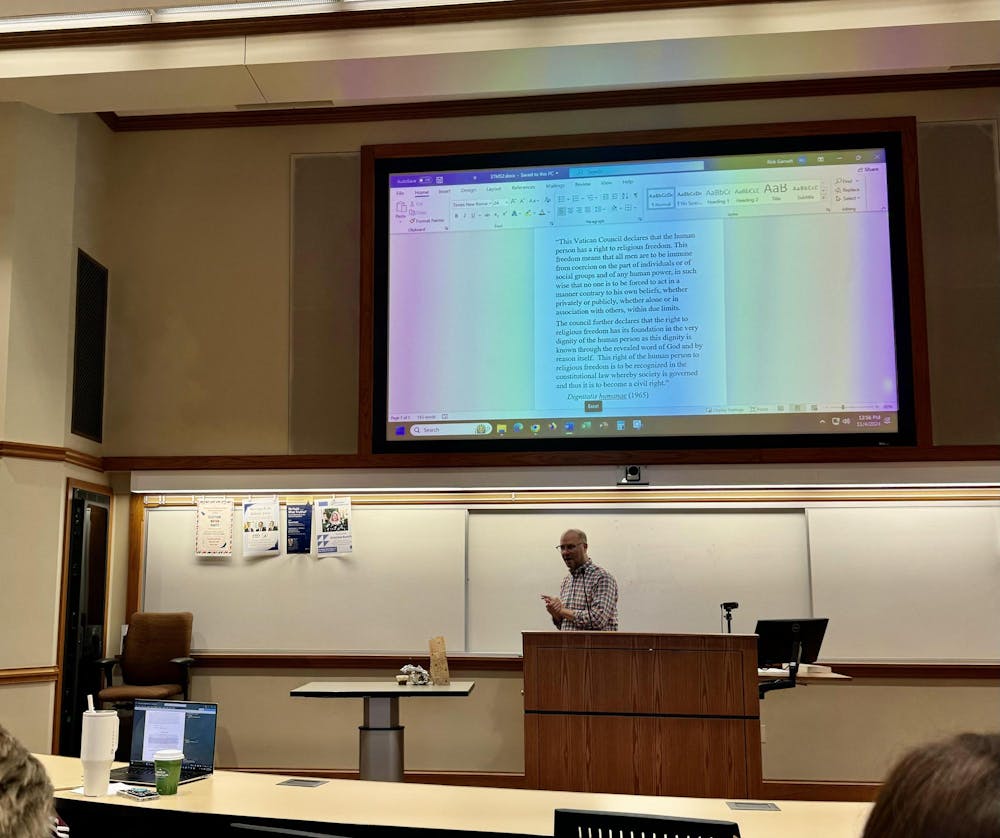On Monday, Notre Dame Law school professor Richard W. Garnett delivered a timely lecture titled “Freedom of Religion in Catholic Teaching and Constitutional Law.”
His lecture addressed the complexities of religious freedom from two perspectives: as understood within the Catholic tradition and as protected by the U.S. Constitution, revealing how these viewpoints influence public policy and individual rights in a democratic society.
Garnett began with a foundational quote from the First Amendment of the U.S. Constitution: “Congress shall make no law respecting an establishment of religion, or prohibiting the free exercise thereof.”
Professor Garnett used this quote to illustrate the bedrock of religious freedom in American law. However, he noted that, unlike many European nations, the United States lacks explicit legal protections for “conscience rights,” leaving certain ethical and moral issues susceptible to shifting legal interpretations.
After identifying this perceived gap, Garnett addressed issues surrounding religious freedom like the accommodation problem and the cooperation problem in the context of U.S. law.
Garnett posed a question central to the accommodation issue: “How should the law deal with situations where, for religious reasons, some people are unable or unwilling to comply with the law?”
He pointed out that, while Americans generally support religious accommodations, the principle can become challenging to apply fairly, especially in a pluralistic society.
“Because for us, we don’t just settle for accommodating beliefs,” Garnett said. “We don’t have any kind of requirements to stand by any particular belief. We don’t have religious tests for offices ... the accommodation problem is more challenging for us because we believe that the free exercise of religion is the ability to act out your faith — not just on Sunday morning — but as a way of living.”
Garnett cited the Affordable Care Act (ACA) as an example, arguing that it imposed a conflict between law and religious freedom. In 2010, the Department of Health and Human Services mandated that employers provide cost-free contraceptive coverage. This requirement extended to employers with strong religious convictions, sparking widespread debate about the ACA’s perceived lack of religious accommodations.
“Sometimes in a pluralistic society,” Garnett said, “there will be laws placed where some people, usually religious minorities, but not always, are unable to exercise their beliefs.”
Garnett also elaborated on the cooperation problem, which arises when religious institutions collaborate with government entities to provide public services — often with government funding.
“These cases usually involve money. These are the cases where the political authorities cooperate with the religious institutions to bring about some form of political good,” he said. “We have always had this in the United States.”
The line between permissible and impermissible government support of religious entities can be thin.
“The government would give money to churches for these types of organizations and institutions. Now, the Supreme Court agrees that cooperation between the government and the Church is permissible. But the question is, how far can that cooperation go,” Garnett said. “Government money can be used to subsidize loans in a Catholic university. But a trickier question is, if there is a hurricane that destroys a Catholic church, how much money can the government provide in aid to rebuild the Catholic church,” Garnett said.










